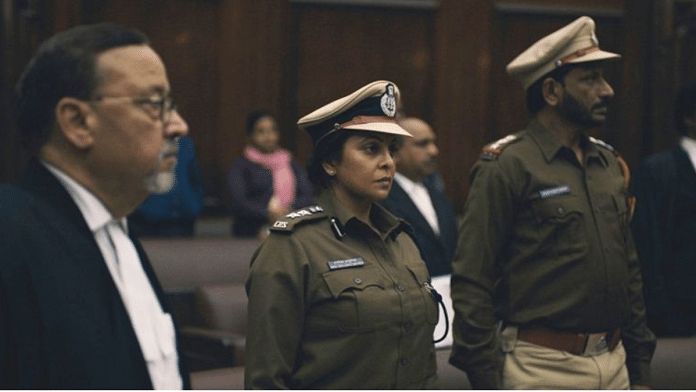Netflix’s Delhi Crime: Season 2 brings forth the ugly side of class disparity that exists in the national capital and its repercussions on crime. It also veers toward caste politics without demeaning anyone, despite portraying the inherent biases in the hierarchy.
The latest season is independent of the previous one, except for the changes in the personal and professional lives of the police personnel who work to keep Delhi safe. In season 2, they race against time to uncover a Kachcha Baniyan gang – actual criminal groups in India that target wealthy homes to rob and bludgeon to death anyone who resists them.
Drawn from real-life instances, the five-episode season, directed by Tanuj Chopra, delves into deeper issues like class, caste and prejudice that exist even among the highly educated and ‘upward’ sections of society.
In an avalanche of Indian crime shows on OTT platforms, Delhi Crime is truly a fresh breath of air. “We focus on characters rather than the crime committed,” says Tanuj Chopra in an interview with ThePrint.
Also read: Better Call Saul on Netflix is right up there with Breaking Bad. Its finale is for the ages
A cast that’s just right
In the last season, ‘Madam Sir’ Vartika’s (Shefali Shah) vulnerability and boss lady demeanour had won everyone over while investigating the 2012 Delhi gangrape case. Shefali Shah as Vartika is even better this season. What constantly stands out is the restraint shown by Shah in her performance, often letting just her eyes speak. She exudes exactly what a senior police official should — confidence and empathy. Even her outbursts are not a display of unnecessary masochism. “I believe there is a lot of strength in vulnerability. Vartika can do what she does in Delhi Crime because she has a very vulnerable side to her,” says Shah about her character.
Rasika Dugal as Neeti, trying to juggle her personal and professional life as a young ACP, is a stellar act. She is probably the most relatable one in the array of police personnel we see in Delhi Crime. The idealism may have developed tiny cracks with the kind of pressure she experiences, but Neeti will never stop believing and doing good.
Rajesh Tailang shows how a man can get the job done with a cool, collected demeanour. He is a quintessential Indian common man — a father worried about the marriage of his daughter. But, at moments, Tailang makes you want to understand him beyond his patriarchal confines. “Police are not simply corrupt or super cops. They are human in Delhi Crime,” he says.
Tillotama Shome shows unmatched talent playing a Kachcha Baniyan gang member called Lata/Karishma, dominating the screen in the later episodes. Shome is a masterclass in portraying nuances of vulnerability — be it Alice in Monsoon Wedding (2001), Ratna in Sir (2018) or Latika in this season of Delhi Crime.
It is interesting to note that all the characters also belong to a certain class and have dreams beyond what is ‘allowed’ for that particular social stature.
Also read: Anurag Kashyap’s Dobaaraa a time and space defying gem. Watch for Taapsee Pannu
Layers of crime
What has stood out for Delhi Crime is its refusal to use voyeurism in its depiction of crime. A conscious effort on the part of producers—Florence Sloan, Aaron Kaplan, Jeff Sagansky, among others—Delhi Crime does not sensationalise even the most brutal of crimes depicted in the show. The focus is really on the investigation rather than just providing a sense of thrill.
The script is tight and keeps you on the edge, especially if you are someone who lives in Delhi. It feels personal. Richie Mehta, director of Delhi Crime: Season 1, has been credited as the creator of the latest one.
The show could have faltered in its depiction of how the police too have biases against certain communities. It looks at DNTs or De-notified Tribes, the communities that were once notified under the Criminal Tribes Acts, enforced by the British in 1871.
Even Vartika Chaturvedi is not free of biases despite being a level-headed and sensible DCP of the South district. But the team of Delhi Crime policemen self-introspect and seek to unlearn them. This is what separates them from those in the system who try to exploit the downtrodden.
The personal may overwhelm the professional at times, as Neeti finds for herself, but it is momentary. After all, what Delhi Crime also does is look at police personnel as human beings with flaws and limitations. That is exactly why it is a league of its own.
(Edited by Humra Laeeq)



